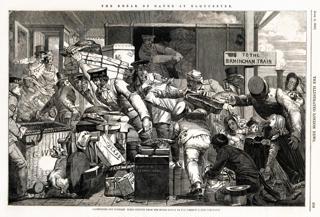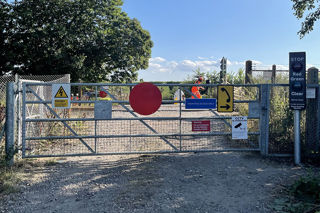The need to reduce the timetable in Scotland by more than 25% is a salutary lesson that public ownership does not always offer the panacea to resolve service delivery issues that many have been led to believe.
What has been largely overlooked is that once any activity is placed in public ownership, it is competing for funding with other spending priorities such as the National Health Service and social care, as well as education and defence budgets.
The need to reduce the timetable in Scotland by more than 25% is a salutary lesson that public ownership does not always offer the panacea to resolve service delivery issues that many have been led to believe.
What has been largely overlooked is that once any activity is placed in public ownership, it is competing for funding with other spending priorities such as the National Health Service and social care, as well as education and defence budgets.
This is not only in terms of investment, but also day-to-day spending.
And for rail, this is focused primarily on employment costs.
The long-running dispute with drivers’ union ASLEF, in respect of staff employed by train operating companies that hold National Rail Contracts, is testimony to the reality whereby the need to control inflation has been held to be of greater priority than pay awards in the public sector.
Hence the rigidity of a 4% pay offer to train drivers in 2023, when inflation levels were far higher.
Unlike the privately owned franchises, where pay expectations were managed by incentives to improve productivity and to maximise revenue by preventing any disruption to services, what is imposed in a public sector environment takes a high-level view of what is affordable, with revenue and reputational loss in the market a cost that the taxpayer has to meet.
It has been noticeable that during the long dispute with traincrew over pay and conditions (which in England remains unresolved), the independently owned freight operating companies and passenger open access operators were able to avoid any service disruption by locally negotiating pay deals that were based on market affordability.
The mistake in national negotiations, which have largely been of a ‘take it or leave it’ variety with long months of silence from the employers (effectively the Department for Transport), was a pretence that the Rail Delivery Group was in any position to make an offer that might form the basis for negotiation to prevent costly disruption.
There is no doubt that the terms and conditions of traincrew employment, in particular the rostering of staff, is completely out of date.
It fails to reflect the change in attitude to a work/life balance that has emerged since the COVID pandemic, where a demand for much greater workforce flexibility has taken place.
Of course, there cannot be any flexibility if you are rostered to drive a train.
The employee must book on as scheduled to read essential operating notices and to undertake train preparation duties where required.
Rostering has always been an integral part of making the timetable work, with links established at larger depots which require specific route learning - including the use of available diversionary routes to bring service resilience.
As well as turns of duty with specific diagrammed content, there can often be a rostered cover driver to avoid cancellations in the event of short-notice absence.
As weekday turns extend over six days, a system of rest day relief operates - and there must be sufficient drivers to cover these turns.
An additional category are drivers provided for general purpose relief to cover planned absence such as holidays and training needs - either for traction or routes.
Sunday rostering is based on volunteering to work a diagram.
And at a time when railway pay was far lower in real terms than it is today, there was no shortage of volunteers willing to enhance their pay.
If there are insufficient trained staff to fill the various types of depot diagrams, then running the train service becomes dependent on working rest days and overtime to cover the gaps.
It has been common practice not to have a full complement of staff, to allow higher earnings from rest day working and overtime.
But (as has been seen) this has brought a source of leverage by a collective refusal to work the additional time and a reluctance to volunteer for Sunday work.
It is abundantly clear that what we have now is unfit for current day needs, and that traincrew arrangements must reflect the 24x7 nature of the timetable where many more trains are running on Sundays than in the past.
Better basic pay also means that the past concept of maintaining a vacancy gap to enhance earnings must end if the work/life expectations of staff are to be met.
Ambitions about diversity are also a part of this equation, as staff who have family responsibilities across the spectrum must have certainty about the attendance time expected.
The need for change is widely recognised, but tying this to a below-inflation pay award is never going to work.
As the number of train operating companies managed by Directly Operated Railways increases, the initiative must be taken at that level and implemented as relevant companies come into public ownership.
In Scotland, where the devolved government terminated the Abellio franchise in March 2022, and failed to reach agreement with Serco for the Caledonian Sleeper contract at the time of the break clause in June 2023, what would have been a commercial imperative to reach an agreement covering the pay and conditions for staff has been removed.
Rail staff in Scotland are now regarded as being within the official pay policy set by Scottish Ministers, which is a 2% increase from April 2024 and a further 1% from January 2025 (rejected by the railway trade unions in July).
Although in line with inflation, an improved offer is being sought.
But the trade unions may be about to find out that there are no exceptions to be negotiated when it comes to public pay policy.
The more thoughtful may reflect on the lack of private sector pay flexibility, and that the public sector cannot behave in the same way.
But sadly, this is what nationalisation brings.
Although ASLEF and the RMT have said they will conduct a ballot to authorise industrial action up to and including authorisation to call strikes, ScotRail says that the current disruption reflects staff dissatisfaction and worsening industrial relations within the company.
As a general theme, the government has said that it wants to see more powers for transport provision in the hands of devolved authorities, but there is an evident reluctance to provide adequate funding - as is the case in Wales, where rail cutbacks have already started.
Login to continue reading
Or register with RAIL to keep up-to-date with the latest news, insight and opinion.



















Login to comment
Comments
No comments have been made yet.